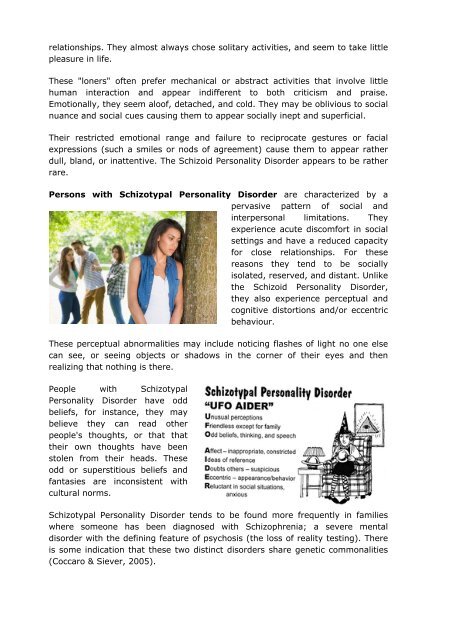personality disorders explained
Antisocial Personality Disorder, Codependence, Narcissism and Borderline
Antisocial Personality Disorder, Codependence, Narcissism and Borderline
You also want an ePaper? Increase the reach of your titles
YUMPU automatically turns print PDFs into web optimized ePapers that Google loves.
elationships. They almost always chose solitary activities, and seem to take little<br />
pleasure in life.<br />
These "loners" often prefer mechanical or abstract activities that involve little<br />
human interaction and appear indifferent to both criticism and praise.<br />
Emotionally, they seem aloof, detached, and cold. They may be oblivious to social<br />
nuance and social cues causing them to appear socially inept and superficial.<br />
Their restricted emotional range and failure to reciprocate gestures or facial<br />
expressions (such a smiles or nods of agreement) cause them to appear rather<br />
dull, bland, or inattentive. The Schizoid Personality Disorder appears to be rather<br />
rare.<br />
Persons with Schizotypal Personality Disorder are characterized by a<br />
pervasive pattern of social and<br />
interpersonal limitations. They<br />
experience acute discomfort in social<br />
settings and have a reduced capacity<br />
for close relationships. For these<br />
reasons they tend to be socially<br />
isolated, reserved, and distant. Unlike<br />
the Schizoid Personality Disorder,<br />
they also experience perceptual and<br />
cognitive distortions and/or eccentric<br />
behaviour.<br />
These perceptual abnormalities may include noticing flashes of light no one else<br />
can see, or seeing objects or shadows in the corner of their eyes and then<br />
realizing that nothing is there.<br />
People with Schizotypal<br />
Personality Disorder have odd<br />
beliefs, for instance, they may<br />
believe they can read other<br />
people's thoughts, or that that<br />
their own thoughts have been<br />
stolen from their heads. These<br />
odd or superstitious beliefs and<br />
fantasies are inconsistent with<br />
cultural norms.<br />
Schizotypal Personality Disorder tends to be found more frequently in families<br />
where someone has been diagnosed with Schizophrenia; a severe mental<br />
disorder with the defining feature of psychosis (the loss of reality testing). There<br />
is some indication that these two distinct <strong>disorders</strong> share genetic commonalities<br />
(Coccaro & Siever, 2005).

















